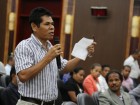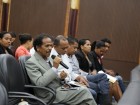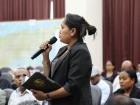The Office of the Prime Minister, in cooperation with civil society that operates in the sector of National Security, held a meeting to consult with civil society on the Strategic Concept of National Defence and Security (SCNDS), on October 12th, at the conference room of the Headquarters of F-FDTL, in Fatuhada, Dili. This meeting was held, following orientation of the Prime Minister, during the first meeting at ministerial level on September 7th, 2015, on the importance of the contribution of civil society to the Strategic Concept of National Defence and Security.
The meeting was started by Brigadier General of F-FDTL, Filomeno Paixão, who was the main presenter of the “Project of Strategic Concept of Defence and Security”.
Following this meeting, the involvement of two representatives of civil society was requested, João Almeida, from Fundação Mahein, and José Luís de Oliveira, from Asia Justice and Right (Ajar), who presented civil society’s view on the SCNDS.
 This meeting was attended by 54 representatives of civil society, including national university teachers, veterans, journalists and also members of religious institutions. The debate was very dynamic and discussed the concept associated with hierarchy based on the law and the policies in force. Also raised was the issue of training and professionalism to respond to threats against national security, both internally and externally. In this constructive environment, the participants also presented some recommendations on the design of the SCNDS, which were put to the Government’s consideration.
This meeting was attended by 54 representatives of civil society, including national university teachers, veterans, journalists and also members of religious institutions. The debate was very dynamic and discussed the concept associated with hierarchy based on the law and the policies in force. Also raised was the issue of training and professionalism to respond to threats against national security, both internally and externally. In this constructive environment, the participants also presented some recommendations on the design of the SCNDS, which were put to the Government’s consideration.
João Almeida, in his intervention, demanded that more opportunities were given for civil society to participate in the process of design of the SCNDS, as at in the stage of design it still needs basic structural documents for the development of the defence force. However, José Luís Oliveira, from Asia Justice and Rights, reaffirmed that the State guarantees the national defence and security for its citizens. Thus, the participation of citizens in national security is one of their rights, postulated in the Constitution, because they themselves created the State.
In the debate session, the moderator, Anacleto da Costa Ribeiro, gave opportunity for participants – from, namely, the Universidade de Timor-Leste (UNTIL), Ombudsman for Human Rights and Justice, November 12th Committee, National Youth Council of Timor-Leste and Veterans – to comment on the concept under consideration. The Brigadier recognized the relevance of the recommendations to formulate the concepts before submitting the project to the Council of Ministers.